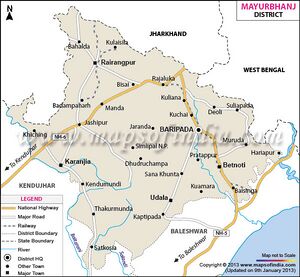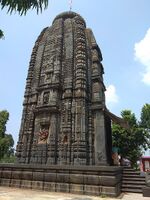Khiching
| Author:Laxman Burdak, IFS (R) |

Khiching (खिचिंग) is an ancient historical place in Mayurbhanj district of Orissa situated near the border of Kendujhar district.[1] It was a capital of Bhanja rulers, located in Panchpir subdivision.[2]
Variants
- Khijjinga (खिज्जिङग) mentioned verse-26 of Koni Stone Inscription Of Prithvideva II - (Kalachuri) Year 900 (=1148 AD) [3]
- Khijjinga Kota
Location
Khiching is located about 50 km east of Keonjhargarh city 24 km west of Karanjia.There are several villages in the vicinity, including Sukruli, Kesana, Naupana, Kakharupana, Salabana, Viratagada, Kichakagada. Another nearby village is Singda. The ancient capital of the Bhanja rules, Khiching lies about 205 Km away from Balasore and 150 km from Baripada.
History
The whole District of Keonjhar was a princely state before its merger with Odisha. From the history it reveals that a part of the old Khijjinga territory with headquarters at Khijjinga Kota, identified with modern Khiching. It became a separate state with Jyoti Bhanja as its ruling chief sometime during the first half of the 12th century A.D.
Tourist attractions

Scores of temples dominate the place, some of which are still in active worship. The predominant deity of Khiching is Kichakeswari, the most scared Goddess of the Mayurbhanj chiefs. The temple dedicated to her is built entirely of chlorite slabs and unique of it kind in India. The sculptures are beautiful. A small museum here boasts of highly important historical specimens of sculpture and art. [4]
The major festival in Khiching is Shivarathri, which is celebrated over seven days.
The major tourist attraction of Khiching is the Temple Of Maa Kichakeswari. The temple was constructed during the year 920/925. Goddess Kichakeshwari, which was not only ishtadevata and kuladevi of Bhanj dynasty but also the State deity of Princely State of Mayurbhanj ruled by them. The temple suffered in the hand of Vandals. King of Mayurbhanj, Maharaja Pratap Chandra Bhanjdeo reconstructed the temple in the year 1934 spending an approximate amount of ₹ 85,000.00. Height of the temple is 100 ft (30 m) and total area is 1764sq.ft. Main temple remains closed between 12 noon to 3 PM. There is a museum constructed by Maharaja Purna Chandra Bhanjdeo in the year 1922.[5]
Koni Stone Inscription Of Prithvideva II - (Kalachuri) Year 900 (=1148 AD)
Koni Stone Inscription Of Prithvideva II - (Kalachuri) Year 900 (=1148 AD) mentions in Verse 26 about the exploits of Purushôttama. He conquered the Khimmindi mandala, made the Talahâri mandala attractive, punished Dandapura, subjugated Khijjinga, killed Haravôhu and threatened the ruler of Dandabhukti. It may be noted that some of these countries are also mentioned in a fragmentary verse eulogising the Kalachuri king Jajalladeva I, which occurs in his Ratanpur stone inscription, dated K 8663 Jajalladeva is said to have received annual tributes from the rulers of Dakshina Kosala, Andhra, Khimidi, Vairagara, Lanjikâ, Bhanara, Talahari, Dandakapura, Nandavali and Kukkuta. It will be noticed that Khimidi, Talahari and Dandapura (दण्डपुर) are common to the two lists of countries. It may therefore be conjectured that Purushôttama took a prominent part in the expeditions of Jajalladeva I against the rulers of these three countries. (p.465). [6]
खिचिंग
खिचिंग ओडिशा के मयूरभंज जिले में स्थित एक प्राचीन ऐतिहासिक गाँव है। यह भंज वंश की प्राचीन राजधानी है। भंज का राजवंश चित्तौड़ के राजाओं की एक शाखा थी। इस राज्य के दो खंड थे जो क्रमश: खिचिंग और खिंजली कहे जाता थे। इस राजवंश के संस्थापक वीरभद्र थे। उन्हें 'आदि भंज' कहा जाता है। उनके संबंध में जनुश्रुति है कि उनका जन्म किसी पक्षी के अंडे से हुआ था और वशिष्ठ ऋषि ने उनका पालन पोषण किया। खिचिंग में दो दुर्गो के अवशेष हैं जो विराटगढ़ और कीचक गढ़ कहे जाते हैं। भंज राजघराने की देवी कीचकेश्वरी कही जाती है। वहाँ उनकी एक दर्शनीय मूर्ति है। वहाँ नीलकंठेश्वर महादेव का मंदिर है जो वास्तुकला की दृष्टि से उल्लेखनीय है। वह भुवनेश्वर के मंदिरों की परंपरा में बना है और कदाचित् ११वीं या १२वीं शती का है।
References
- ↑ mayurbhanj.nic.in
- ↑ https://mayurbhanj.nic.in/tourist-place/khiching/
- ↑ Corpus Inscriptionium Indicarium Vol IV Part 2 Inscriptions of the Kalachuri-Chedi Era, Vasudev Vishnu Mirashi, 1955, p. 463-473
- ↑ https://mayurbhanj.nic.in/tourist-place/khiching/
- ↑ https://www.telegraphindia.com/odisha/history-meets-nature-at-khiching/cid/225528
- ↑ Corpus Inscriptionium Indicarium Vol IV Part 2 Inscriptions of the Kalachuri-Chedi Era, Vasudev Vishnu Mirashi, 1955, p. 463-473
Back to Jat Kingdoms in Ancient India
Back to Orissa

